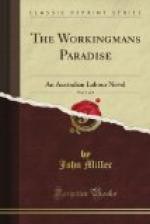“Ned! Be reasonable!” She hesitated. She looked up and down the street. Nothing moved. The moon was directly overhead. There were no shadows. It was like day. An engine whistle sounded like a long wail in the distance. In the silence that followed they could hear the rushing of a train. Ned waited, watching her pain-drawn face. A passionate fear assailed him, blotting out his wrath.
“You recollect my sister?” she asked, looking away from him.
He nodded.
“You heard she died? You spoke of her two years ago.”
He nodded again.
“I did not tell you the whole truth then . . . . . . I did not tell anybody . . . . . . I came down here so as not to tell . . . . . . I could not bear to go home, to chance any of them coming down to Brisbane and seeing me . . . . . . You know.” She stopped. He could see her hands wringing, a hunted look in the eyes that would not meet his.
“Never mind telling me, Nellie,” he said, a great pity moving him. “I’m a brute. I didn’t mean to be selfish but I love you so. It shall be as you say. I don’t want to know anything that pains you to tell.”
“That is your own self again, Ned,” she answered, looking at him, smiling sadly, a love in her face that struck him with a bitter joy. “But you have a right. I must tell you for my own sake. Only, I can’t begin.” Her mouth trembled. Great tears gathered in her eyes and rolled down her cheeks. A lump rose in his throat. He seized her hands and lifted them reverently to his lips. He could not think of a word to say to comfort her.
“Ned!” she said, in a tone almost inaudible, looking at him through her tears. “She died in the hospital but I didn’t tell you how. . . . . She died, oh, a terrible death . . . . . . She had gone . . . . . down, Ned. Right down. Down to the streets, Ned.”
He pressed her hands, speechless. They stood thus facing one another, till down his face, too, the sad tears rained in sympathy, sad tears that mourned without reproach the poor dead sister whom the hard world had crushed and scorned, sad tears that fell on his passion like rain on fire and left in him only a yearning desire to be a comforter. Nellie, snatching her hands away, pressed them to her mouth to stifle the frantic sobs that began to shake her, long awful sobs that drew breath whistling through clenched fingers. And Ned, drawing her to him, laid her head on his shoulder, stroking her hair as a mother does, kissing her temple with loving, passionless kisses, striving to comfort her with tender brotherly words, to still her wild cries and frantic sobs in all unselfishness. There were none to see them in all this moonlit city. The wearied toilers, packed around them, slumbered or tossed unconsciously. Above them, serene and radiant, the full moon swam on amid the stars.
“She was so good, Ned,” cried Nellie, choking, with sobs, almost inarticulate, pouring out to him the pent-up thinking of long years. “She was so good. And so kind. Don’t you remember her, Ned? Such a sweet girl, she was. It killed her, Ned. This cruel, cruel life killed her. But before it killed her—oh!—oh!—oh!—oh! Why are we ever born? Why are we ever born?”




